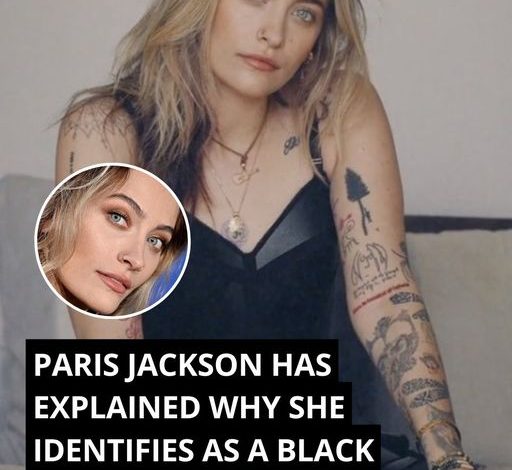
ADVERTISEMENT
Paris Jackson explains why she’s black
In a revealing interview, Paris Jackson, daughter of the late Michael Jackson, openly discussed being black. While her father became an important figure in music and the world, Paris went her own way and embraced her ethnicity as well. The fact that he identifies as biracial and strongly claims that he is black, despite being handsome, concerns many people.
Understanding Paris Jackson’s Identity Journey
In this interview, Paris describes her experiences and feelings regarding race. She admits that due to her mixed heritage, many people question her choice to identify as black. As many people know, his father, Michael Jackson, is of African American descent, although he appeared white in the last years of his career. In an interview with Oprah in the 1990s, she revealed that the change in skin color was caused by a disease called vitiligo. This caused his skin to change from dark to white. (1)
Paris talks about her upbringing and how her father always encouraged her and her siblings to embrace their heritage. He thought about the number of allegations that Michael Jackson was not actually his biological father. None of these rumors turned out to be true. However, these have not been proven to be lies either. Paris says her father always reminded her and her brother that they had African American roots.
“He looked me in the eye, pointed his finger at me, and said, ‘You’re black.’ Enjoy your roots. ” “And I said, ‘Well, this is my father, why would he lie to me?’ ”
ADVERTISEMENT
Responses from the Internet
When the Paris Jackson interview became popular, mixed opinions exploded on the Internet. Some praised her for accepting her identity and accepting it wholeheartedly. They agreed that even if Michael Jackson was his biological father. Although technically it was, many brought back stories of friends or relatives who had children from mixed marriages, and the child turned out to be as white and blond as the white mother, not even resembling dark skin or hair.
However, others expressed doubts and wondered whether this was true, especially considering that he appeared white and had light skin. This response sparked a broader discussion about the issues faced by white people who identify as white compared to those who identify as black.
“Paris Jackson is not black, just like Logic and Halsey are not black. If not that black man was her biological father, or just her father. ‘ tweeted user @Janetscoop. (2)
Media star Wendy Williams joins the conversation. Even if a white person has a black parent, they likely won’t face the same challenges, she said. This isn’t about race, it’s about visible skin color.
‘I see you think you’re black or something but I’m just talking about the pictures because you know… black is not what you call it, it’s what the police see when they see you in the pool. . This is what they see. But this is a good and pleasant thing for him. said. 97 Although many biracial people experience identity issues and feel like they “fit in” with one group or another, they do not always experience the same level of oppression and danger as black or all-black identity.
ADVERTISEMENT
The problem of color and hybridization is a serious problem. In society, white people have certain privileges and advantages, mainly due to their ability to navigate white space. They may also feel isolated or have difficulty fully integrating their identity.
It is important to recognize and respect that each person’s experience is unique and to understand the differences between race and how this relates to other areas of human identity such as gender, class, and culture. However, it is important for white people to understand and accept that they may never experience the same systemic discrimination as people of color.
Whites and white whites must educate themselves
Paris Jackson’s candid interview Paris sheds light on the complexities of racial identity and how personal experiences contribute to her understanding. His journey reminds us that identity is multifaceted and influenced by cultural heritage and experiences.
However, this also shows a lack of understanding that there are real issues that people of color deal with every day. If you are white, you will not have the same experiences as black people, regardless of your origins. You will never encounter racism, overt violations, or micro-violations. You won’t have the same innate fear of the police or pressure to dress a certain way so as not to appear ‘scary’ to those around you. While
biracial white people can acknowledge their roots and race, it is important that they also acknowledge the privilege that people of color have. This gratitude will pave the way for change for the better in the future.
ADVERTISEMENT




